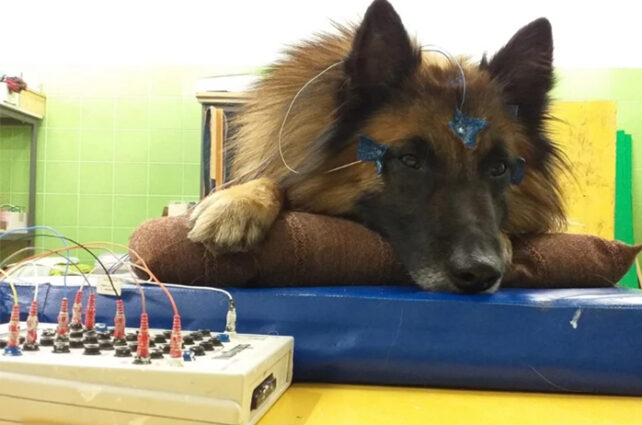From their astute ability to read our emotions to their impressive language and number comprehension, canine powers of understanding continue to amaze. Now it seems they may also be able to listen to us in their sleep.
A small pilot study of 13 dogs reveals dogs' brains deep in the throes of slumber light up in response to other canine and human voices, similar to when they're awake.
"This finding is significant insofar as it is the first evidence of complex auditory processing during sleep in dogs," Eötvös Loránd University ethologist Huba Eleőd and colleagues write in their paper.

The cooperative canines were hooked up to devices that measure their event-related potential brain wave responses. They were then exposed to dog and human vocalizations while awake, drowsy, or after being allowed to fully relax and fall asleep.
Each sound was played at the same volume and lasted about one second. They included yelps, whines, growls, coughs, laughs, sighs and yawns. No negative sounds were used to avoid startling the dogs awake.
Even when in non-REM sleep, the dogs could seemingly tell whether a noise came from other dogs or humans, and whether the communication's emotion, or valence, was positive or neutral.
This ability has also been demonstrated in primates, including humans and some other non-primates like mice. Given mammals spend a large portion of our time asleep, being able to process social cues even in this state has likely played a vital role in our survival.
How much we comprehend while we slumber depends on both the stage of sleep we're in and the type of noise we're experiencing. For example, even in sleep our names elicit a different response to other sounds.
Like us, dogs rely on sleep to consolidate their memories and process emotions. Their sleep has changed with their domestication and resembles ours more than other laboratory species'. They are also plagued with shallow and interrupted sleep in their old age like people who suffer from dementia.
While further research will be needed to verify these findings, the findings add to a growing list of similarities between canine and human sleep behavior, Eleőd and colleagues explain, building support for the use of dogs in comparative neurobiology research.
"Although use of a non-invasive ERP paradigm with dogs is quite labor-intensive, it is nevertheless the most feasible possibility to study vocal stimuli processing during sleep, as it does not require prior training and does not cause any distress or harm," the team writes.
We're keen to see what else our most trusted animal companions can help us discover about our shared mammalian brains.
This research was published in Scientific Reports.
